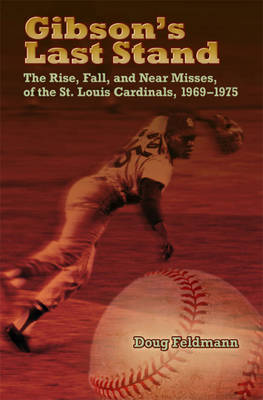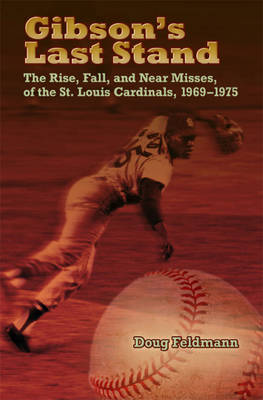
- Retrait gratuit dans votre magasin Club
- 7.000.000 titres dans notre catalogue
- Payer en toute sécurité
- Toujours un magasin près de chez vous
- Retrait gratuit dans votre magasin Club
- 7.000.0000 titres dans notre catalogue
- Payer en toute sécurité
- Toujours un magasin près de chez vous
Gibson's Last Stand
The Rise, Fall, and Near Misses of the St. Louis Cardinals, 1969-1975
Doug Feldmann
30,45 €
+ 60 points
Description
During star-pitcher Bob Gibson's most brilliant season, the turbulent summer of 1968, he started thirty-four games and pitched every inning in twenty-eight of them, shutting out the opponents in almost half of those complete games. After their record-breaking season, Gibson and his teammates were stunned to lose the 1968 World Series to the Detroit Tigers. For the next six years, as Bob Gibson struggled to maintain his pitching excellence at the end of his career, changes in American culture ultimately changed the St. Louis Cardinals and the business and pastime of baseball itself.Set against the backdrop of American history and popular culture, from the protests of the Vietnam War to the breakup of the Beatles, the story of the Cardinals takes on new meaning as another aspect of the changes happening at that time. In the late 1960s, exorbitant salaries and free agency was threatening to change America's game forever and negatively impact the smaller-market teams in Major League Baseball. As the Cardinals' owner August A. Busch Jr. and manager Albert "Red" Schoendienst attempted to reinvent the team, restore its cohesiveness, and bring new blood in to propel the team back to contention for the pennant, Gibson remained the one constant on the team.In looking back on his career, Gibson mourned the end of the Golden Era of baseball and believed that the changes in the game would be partially blamed on him, as his pitching success caused team owners to believe that cash-paying customers only wanted base hits and home runs. Yet, he contended, the shrinking of the strike zone, the lowering of the mound, and the softening of the traditional rancor between the hitter and pitcher forever changed the role of the pitcher in the game and created a more politically correct version of the sport.Throughout Gibson's Last Stand, Doug Feldmann captivates readers with the action of the game, both on and off the field, and interjects interesting and detailed tidbits on players' backgrounds that often tie them to famous players of the past, current stars, and well-known contemporary places. Feldmann also entwines the teams history with Missouri history: President Truman and the funeral procession for President Eisenhower through St. Louis; Missouri sports legends Dizzy Dean, Mark McGwire, and Stan "the Man" Musial; and legendary announcers Harry Caray and Jack Buck. Additionally, a helpful appendix provides National League East standings from 1969 to 1975.Bob Gibson remains one of the most unique, complex, and beloved players in Cardinals history. In this story of one of the least examined parts of his career--his final years on the team--Feldmann takes readers into the heart of his complexity and the changes that swirled around him.
Spécifications
Parties prenantes
- Auteur(s) :
- Editeur:
Contenu
- Nombre de pages :
- 256
- Langue:
- Anglais
- Collection :
Caractéristiques
- EAN:
- 9780826220127
- Date de parution :
- 21-06-13
- Format:
- Livre broché
- Format numérique:
- Trade paperback (VS)
- Dimensions :
- 157 mm x 235 mm
- Poids :
- 426 g

Les avis
Nous publions uniquement les avis qui respectent les conditions requises. Consultez nos conditions pour les avis.






